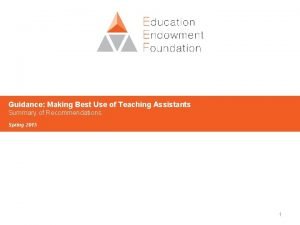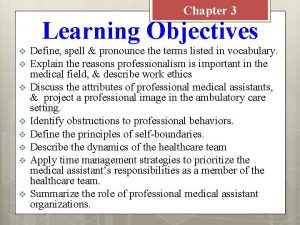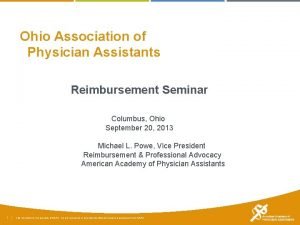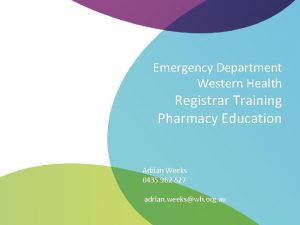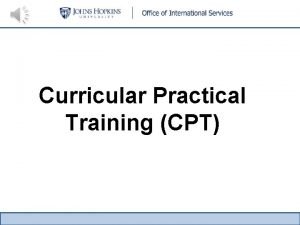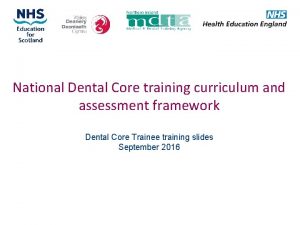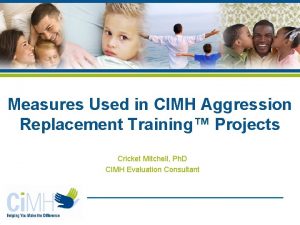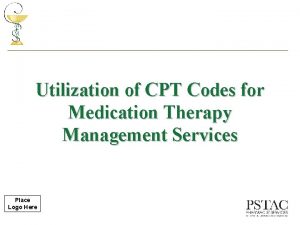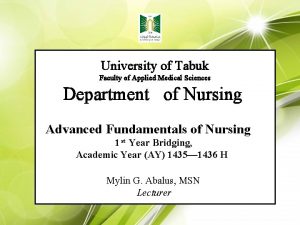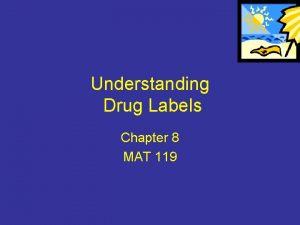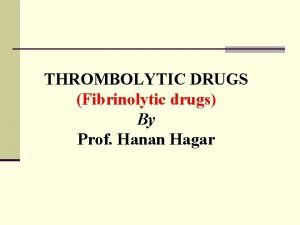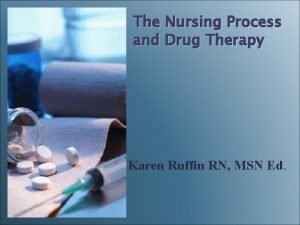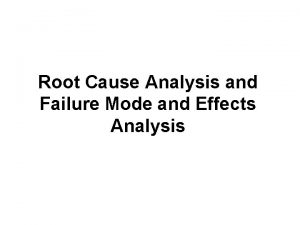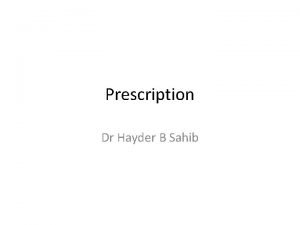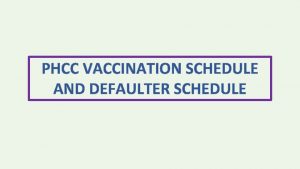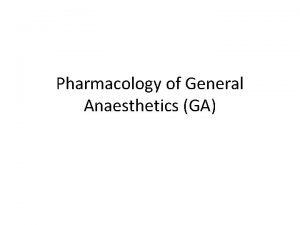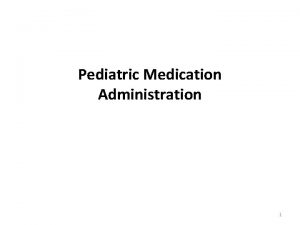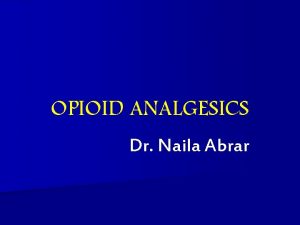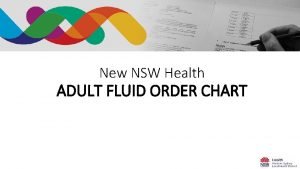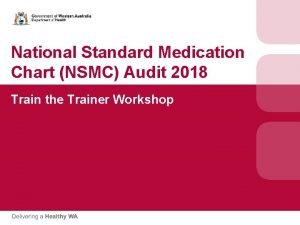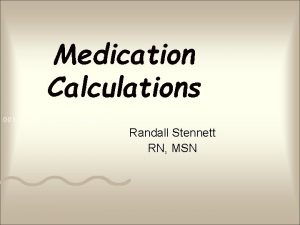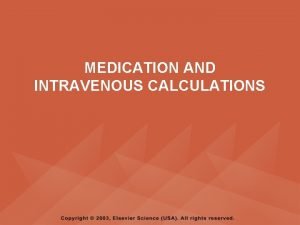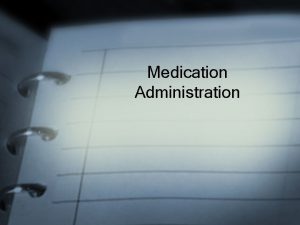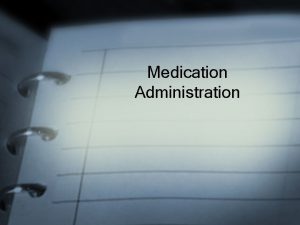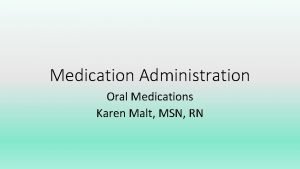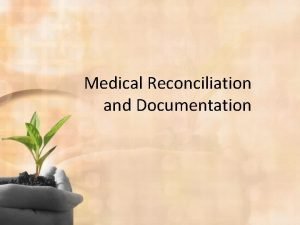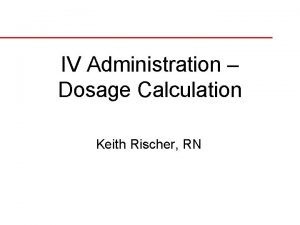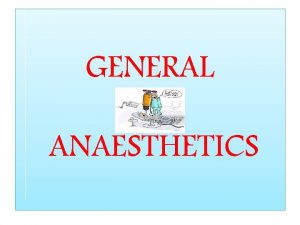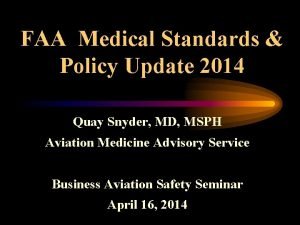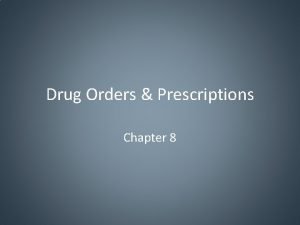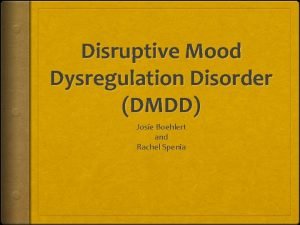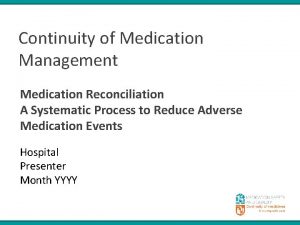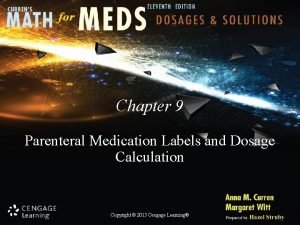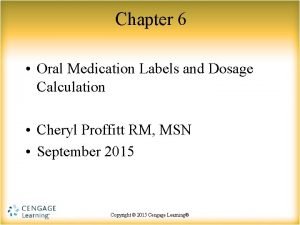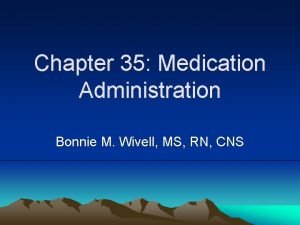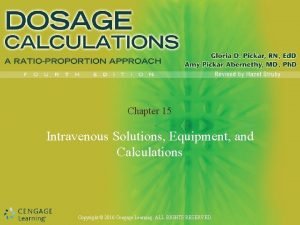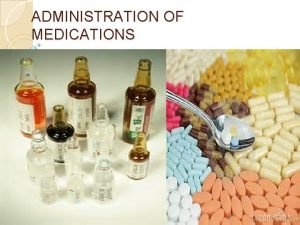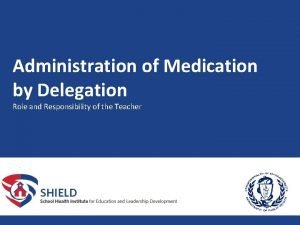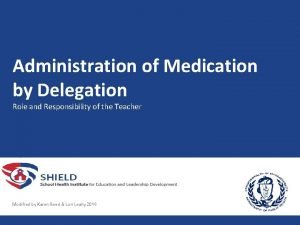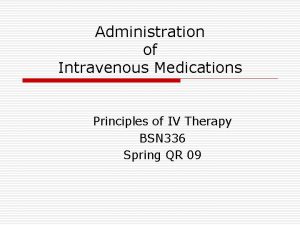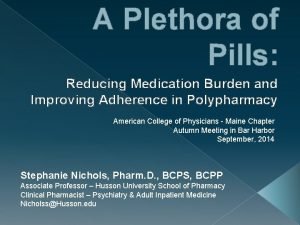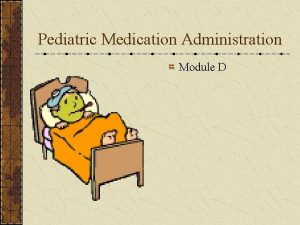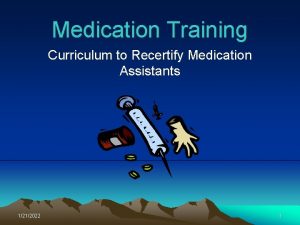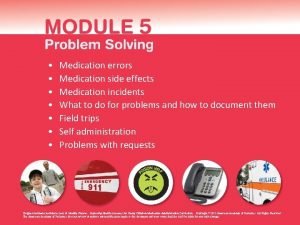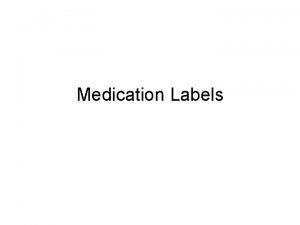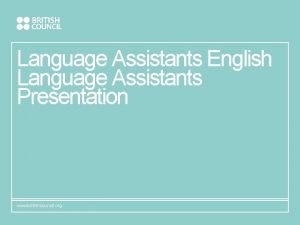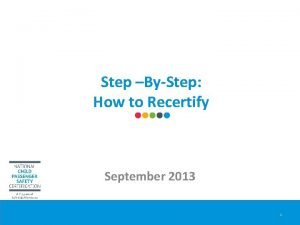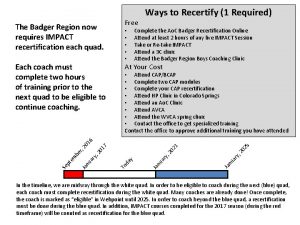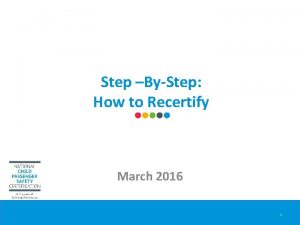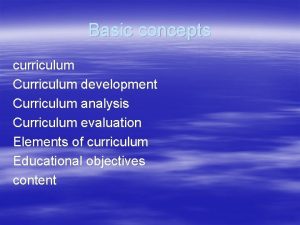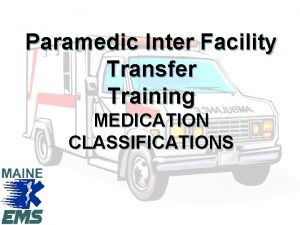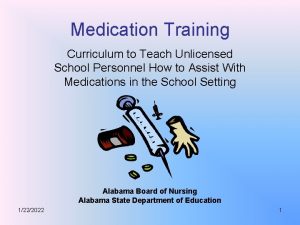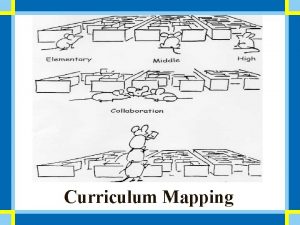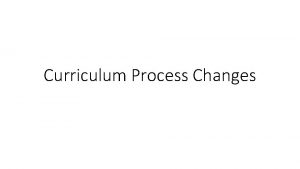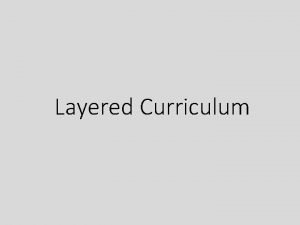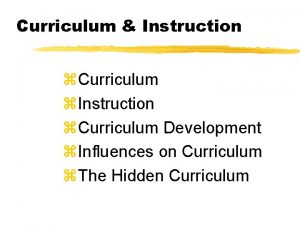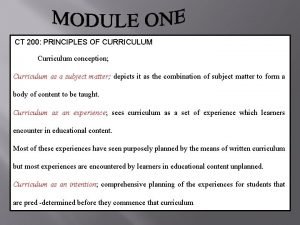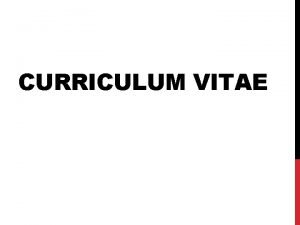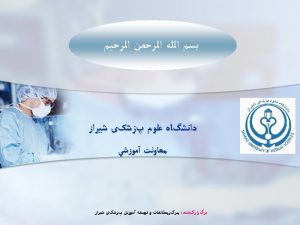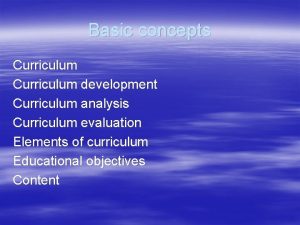Medication Training Curriculum to Recertify Medication Assistants 10292020























































- Slides: 55

Medication Training Curriculum to Recertify Medication Assistants 10/29/2020 1

Related Issues: School Health • The Nurse Practice Act • The Alabama Board of Nursing Administrative Code • Delegation by school nurses • Americans with Disabilities Act • Confidentiality and privacy • Responsibilities of the school nurse 10/29/2020 2

Alabama Board of Nursing • The Alabama Board of Nursing: – Regulates the nursing education programs in Alabama. – Assures that before issuing a license, the individual applicant meets all the legal requirements. – Assures that the applicant passes “state boards”---a national examination that determines the individual’s knowledge and competence to practice nursing. • The holder of a nursing license is under the authority of the Board of Nursing. 10/29/2020 3

The Nurse Practice Act • The Alabama Board of Nursing was established in 1915 by the Alabama legislature. • The “Nurse Practice Act” is the term used to refer to the statutes that established the Board and the foundational laws for nursing practice. • The Alabama Board of Nursing Administrative Code contains the published regulations. 10/29/2020 4

The Nurse Practice Act • The statute establishes the broad power and authority of the Board of Nursing and the regulations set out specifics. • In calendar year 2000, the Board of Nursing began work with school nurses, educators, and school administrators to address how, and who gave medicines in the schools. • Prior to December 3, 2001, school nurses could teach unlicensed school employees or teachers about medicines but could not delegate a nursing task or function to the unlicensed person. 10/29/2020 5

Delegation • Delegation is defined in the Board of Nursing regulations. • Chapter 610 -X-2 -. 06 (2) states that delegation is “the act of authorizing a competent individual to perform acts supportive to registered nurses or licensed practical nurses in selected situations. ” • Delegation is a key issue because the licensed nurse retains responsibility for the task that is delegated to someone else---someone else performs the task but the nurse retains the responsibility for the outcome. 10/29/2020 6

Mission of the ABN • The Alabama Board of Nursing’s legal mandate is the protection of public health, safety, and welfare. • The Board held public hearings, meetings with interested persons, talked with school nurses and decided to provide clarification for school nurse practice. • The Board of Nursing established a section in the Board of Nursing Administrative Code specific to school nurses. 10/29/2020 7

Alabama Board of Nursing Administrative Code • School nurse practice is very different than working in a hospital, nursing home, clinic, or home health. • The school nurse is responsible for the health of children in each school to which he or she is assigned by the local education agency. • Giving medicines is only one area of responsibility for the school nurse. 10/29/2020 8

School Nurse Practice • The Board of Nursing recognized the special nature of school nursing. • The foundation of delegation by a school nurse is found in Alabama Board of Nursing Administrative Code Chapter 610 -X-6, Standards of Nursing Practice. • The section specific to school nurses is given to you so that you have a basic understanding of the school nurse’s responsibility in providing health services to children. 10/29/2020 9

Delegation by School Nurses The specific delegated tasks shall not require the exercise of independent nursing judgment or intervention. Specific tasks that require independent nursing judgment or intervention that shall not be delegated include, but are not limited to: • Catheterization, clean or sterile. • Administration of injectable medications, other than premeasured medication for allergic reactions (i. e. , Epi. Pen). • Administration of rectal or vaginal medications. • Calculation of medication dosages other than measuring a prescribed amount of liquid medication or breaking a scored tablet. 10/29/2020 • • • Tracheotomy care, including suctioning. Gastric tube insertion, replacement, or feedings. Invasive procedures or techniques. Sterile procedures. Ventilator care. Receipt of verbal or telephone orders from a licensed prescriber. 10

Delegation by School Nurses • The task of providing prescribed oral, topical, ear, eye, nasal, and inhalation medications to a student through twelfth grade may be delegated to unlicensed assistive personnel by the school nurse only when the following conditions are met: a. b. 10/29/2020 The school nurse identifies the appropriate individual(s) to assist in providing prescribed medications. The unlicensed assistive personnel selected by the school nurse shall attend a minimum twenty-four hour course of instruction that includes a curriculum approved by the Board and demonstrated competency to perform the delegated task. 11

Delegation by School Nurses • • The school nurse shall provide periodic and regular evaluation and monitoring of the individual performing the delegated tasks. The school nurse shall routinely and periodically conduct quality monitoring of the tasks performed by the unlicensed assistive personnel, including, but not limited to: a. b. c. d. e. 10/29/2020 Training Competency Documentation Error reporting Methods of identification of the right student, the right tasks, the right method, and the right quantity at the right time. 12

Confidentiality • Confidentiality is an important legal concept in the school setting. • Health records of students are confidential and are kept separate from the school records. • Knowing some information from the health record is necessary for the medication assistant. • It is important for the medication assistant to understand that the information provided should not be repeated to other students, school employees and teachers. • Health records contain sensitive information and disclosure without permission can result in legal liability. 10/29/2020 13

Privacy • Privacy is a separate legal concept. • If a child tells a teacher or school secretary how he or she feels about having a chronic illness, that is information that should be shared with the school nurse but not disclosed to those who do not have a “need to know. ” • Students, teachers, and staff spend a great deal of time together over the course of a school year. • It is natural for individuals to talk about situations at school. • Recognize that health information has a higher level of protection. 10/29/2020 14

Confidentiality and Privacy There are some practices that help protect the confidentiality and privacy of students, such as: • Limit access to school health records as defined by policy. • Discuss medication information with appropriate staff only. • Require signature for all non-school health employees accessing health records. • Secure records, avoid public disclosure. • Use appropriate areas for medication and avoid discussion in public areas. • Refer all release of information requests to the school nurse. 10/29/2020 15

Confidentiality and Privacy • Purpose is to protect the health, safety, and welfare of the student. • Some requirements include: – protecting the student’s rights, – managing and monitoring student’s prescribed medicines, – using correct methods to identify students and medicines, and – following guidelines for safety in assisting the school nurse with medications (including storage of medicines and documentation). 10/29/2020 16

The School Nurse delegates assistance with medication based upon: • • Stability of the student’s health status Complexity of the task Competency of the medication assistant Compliance with health records and confidentiality • Clear, written, signed medical order and written parental consent 10/29/2020 17

Responsibilities of the School Nurse in Delegation… • Establishes procedures to ensure that the medication assistant has access to a healthcare professional at all times. • Develops procedures for student specific routine and emergency procedures including: – assisting with medication while at school, – during school-sponsored trips and activities, – and during transportation to and from school. • Performs delegation in accordance with the Alabama Nurse Practice Act. 10/29/2020 18

Responsibilities of the Medication Assistant • Successfully completes: – an ABN approved program for medication assistance by unlicensed school personnel – training specific to the LEA and school – training in student specific issues. • Adheres to local policies and procedures. • Follows the outlined plan of care for individual students. 10/29/2020 19

Responsibilities of the Medication Assistant • Does not participate in activities that require: – professional nursing judgment, knowledge, or skill • Notifies the school nurse when professional nursing care is required. • Notifies the school nurse immediately when there is: – suspicion of a medication reaction, – a medication error, – change in a student’s health status. • Completes timely, accurate documentation in accordance with state and local policies. 10/29/2020 20

Definitions of Nursing Judgment • The intellectual process a nurse exercises in forming an opinion and reaching a clinical decision based upon an analysis of evidence or data (ANA, 1992). • The task does not involve ongoing assessment, interpretation or decision-making which cannot be logically separated from the performance of the task itself (NASN, 1996). • Observations regarding the outcome and the student’s reaction to the task may be recorded, but nursing judgment is not needed in the performance of the task (NASN, 1996). 10/29/2020 21

Specific Rules Related to Prescription Medicine • No prescription medication may be given without: – parent authorization, – a healthcare provider order, and a – pharmacy label. • Review local policies. 10/29/2020 22

Specific Rules Related to OTC Medicine • Under no circumstances should the school stock over-the-counter (OTC) medicines, such as Tylenol, for student or staff use. • OTC must be provided by the parent in the original, sealed container with specific instructions as to when or why such medicines may be necessary. • The delegating RN must evaluate and approve all OTC medicines and parental instructions. • The delegating RN will determine if the OTC medicine is appropriate and whether a provider order is also necessary.

Necessary Knowledge • Medications and how they are used. • Oral medications are packaged as pills/tablets/capsules. • Changing the form of an oral medication can only be done with authorization from the health provider and the delegating school nurse. • Cutting, crushing, or sprinkling of the medication are examples of changing the form of an oral medication. 10/29/2020 24

Necessary Knowledge • Scored tablets are made to be cut in half to obtain a smaller dose. – For example, the prescription may indicate each tablet is 10 milligrams, but the order indicates the student is to take only 5 milligrams (requiring cutting). • If a student has medication that must be cut, call the delegating school nurse. – Do not try to cut a scored tablet with a knife—a pill cutter is used for that purpose and cleaned after each use. • Coated tablets are swallowed whole and should not be chewed. Example: Advil. 10/29/2020 25

Necessary Knowledge • • Capsules are made to be taken by mouth and swallowed whole—do not take apart, crush, or permit the student to chew. Drug actions and possible negative reactions. Trained observation skills. Use of the Six Rights: 1. 2. 3. 4. 5. 6. 10/29/2020 right student right medication right dose right time right route right documentation 26

Necessary Knowledge • Importance of checking the Six Rights each and every time medication is given: – (1) when taking medication from the cabinet, – (2) when pouring the medication, and – (3) when returning the medication to the cabinet. • Appropriate, accurate, timely documentation. • How to obtain assistance from the school nurse and/or other healthcare professionals. • Understanding of local policies. 10/29/2020 27

How to Assist Students with Particular Types of Medications • When the Board of Nursing established regulations that allowed school nurses to delegate certain medications to an unlicensed school employee or teacher— – the route of the medication was specified rather than the names of medicines. • An absolute prohibition exists for injectable medications. • School nurses are prohibited from delegating assisting with medications that must be delivered by injection except for pre-mixed anti-allergy injections (Epi-pen. ) 10/29/2020 28

Safety • NOTE: The authority for licensed school nurses administering medication to a student must come from the prescriber and the parent/guardian. • The registered school nurse may decide, in certain situations, to delegate the assistance of medication (e. g. , oral, topical, inhalation, eye, ear, or nose drops) to unlicensed school personnel (e. g. , secretaries, office assistants) pursuant to the Alabama Board of Nursing Administrative Code, Chapter 610 -X-6 -. 05. • The licensed practical nurse in the school setting may delegate once the registered nurse determines the appropriateness of the delegation. 10/29/2020 29

Structure Criteria Assisting students with medication requires the following: • A signed authorization/order from a licensed prescriber • Information regarding potential side effects, contraindications, and adverse reactions • Parent/guardian authorization • Medication labeling • Medication storage • Assisting with medication 10/29/2020 30

Prescriber Authorization/Order • The signed prescriber’s authorization is required at the beginning of each school year and/or before any medication can be given at school. – If the medication order is changed during the school year (e. g. , change in dosage), an additional prescriber authorization/order is necessary (See Appendix form). • Nonprescription medications, when provided, should be given following the same policies and procedures as followed for prescription medications with the exception of situations where the local medication policy requires parental/guardian permission only before administration of medication. Homeopathic/Naturopathic medications should not be administered without the explicit order of an authorized prescriber and verification that the product is safe to administer. • Must include: – – – Name of student. Name of medication with dosage and route (e. g. , oral, topical). Frequency and time medication given. Date of the order and the discontinuation date, if applicable. Any known drug allergies or reactions

Information Regarding Potential Side Effects, Contraindications, and Adverse Reactions • A list of potential side effects for medication taken over 30 days and a physician order for treatment for specific students in the event of an adverse reaction should be obtained. • This information should be readily available to school personnel who are eligible to assist students with medication. • Information regarding medication side effects and treatment orders should also be documented by the registered school nurse in the student health record, the individual health care plan (IHCP), and/or the individual emergency action plan as applicable. 10/29/2020 32

Parent/guardian authorization • The parent/guardian must sign the consent form at the beginning of the school year and/or before any medication is given at school authorizing school personnel to assist students with medication. • If the medication order is changed (e. g. , dosage change) during the school year, an additional consent form is required (See Appendix). 10/29/2020 33

Medication Labeling • For prescription medications, a pharmacy-labeled container is required which includes – the student’s name, prescriber’s name, name of medication, strength, dosage, time interval, route, and date of drug’s discontinuation when applicable. • If the medication will be provided for two weeks or longer, the parent/guardian should request two containers from the pharmacist, with one labeled for school use. • When the medication to be provided is a nonprescription medication (OTC), an original, unopened, sealed container of the drug identifying the medication and the entire manufacturer’s labeling plus the student’s name (written legibly on the container) should be supplied by the parent/guardian.

Medication Labeling • Additionally, the parent must indicate under which specific conditions/complaints that this nonprescription or over the counter medication (OTC) should be provided. • Unlicensed school personnel should not be placed in the position of determining when or what medication should be provided for a student (i. e. , that determination requires nursing judgment which is prohibited for an unlicensed person to perform). 10/29/2020 35

Medication labeling • To avoid this problem, the LEA may require a prescriber authorization/order for nonprescription (OTC) medications. • Under no circumstances should the school stock OTC medications (e. g. , Tylenol, Pepto-Bismol, antibiotic ointment) as this practice would violate the Board of Pharmacy regulations in that LEAs could be seen as “prescribing medication”, a function of physicians, dentists, nurse practitioners, and physicians’ assistants or “dispensing” medication, a function of the pharmacist. 10/29/2020 36

Medication Storage • Public health standards state that medications should not be stored in food storage areas. • It is recommended that no more than a six-week, school day supply of the prescribed medication be stored at school. • When the course of medication is completed, out of date, or at the end of the school year, the parent/guardian shall be advised to pick up any unused portions of medication. 10/29/2020 37

Medication Storage • The school nurse or other school personnel designated by the school nurse in the presence of a witness will destroy medications not picked up by the parent/guardian. • It is strongly recommended that medications should be discarded in a manner consistent with federal guidelines set by The Office of National Control Policy. • Any discarded medication should be documented on the student’s medication record.

Assisting With Medication • This specific record should be kept for all students requiring medication. • All medication records should be filed at the end of the school year as part of the student’s confidential health record and in accord with local policy. 10/29/2020 39

Assisting With Medication • It is suggested that each LEA develop specific guidelines to address the storage, restricted access, confidentiality, and transfer of such records as appropriate. • Before assisting with any medication, the signed prescriber order/authorization should be reviewed carefully and attached to the medication record. • Copies of the prescriber’s signed order/authorization for medication should also be filed and documented with the student’s school health record and included in the individual health care plan (IHP), developed by the registered school nurse. 10/29/2020 40

Self Administration of Medication • Self-administration means— the student is able to consume, inject, instill, or apply prescription medication in the manner directed by the licensed prescriber, without additional assistance or direction. It is recommended that self-administration of medication be permitted only when the following requirements are met: • The licensed prescriber indicates that self-administration of the specific medication is permitted on his/her signed order/authorization. • The consent form signed by the student’s parent/guardian indicates that the student may self-administer the medication. • The registered school nurse is reasonably assured that the student is able to identify and select the appropriate medication, knows the frequency and purpose of the medication as ordered, and follows the school self-administration procedures (e. g. , safety and security precautions). 10/29/2020 41

Self Administration of Medication (new slide) • Students may self administer medication only for Chronic Health Conditions provided certain requirements are met. A Chronic health condition/illness is defined as “a physical, physiologic, developmental impairment; an anatomical, physiological or mental impairment that interferes with an individuals ability to function in the environment; one that is long-term (usually more than 3 months duration) and is either not curable or has residual features that result in limitations in daily living requiring adaptation in function or special assistance; a medical condition that interferes with daily functioning for more than three months in a year, causes hospitalization for more than one month in year, or (at time of diagnosis) is likely to do either of these. ” (Schwab & Gelfman, 2001)

Self Administration of Medication Self-administration means that the student is able to consume, inject, instill, or apply medication in the manner directed by the licensed prescriber, without additional assistance or direction. It is recommended that selfadministration of medication be permitted only when the following requirements are met: The licensed prescriber indicates that self-administration of the specific medication is permitted on his/her signed order/authorization. • The consent form signed by the student’s parent/guardian indicates that the student may self-administer the medication. • The registered school nurse is reasonably assured that the student is able to identify and select the appropriate medication, knows the frequency and purpose of the medication as ordered, and follows the school selfadministration procedures (e. g. , safety and security precautions, proper labeling). • The registered school nurse has assessed and documented the student’s health status and abilities and determined self-administration to be safe and appropriate for this particular student.

Self Administration of Medication • The school nurse collaborates with school personnel, student, and/or parent/guardian to determine a safe place for storing the medication while providing for student accessibility when the medication is needed. • Some medications such as asthma inhalers or emergency injections (e. g. , Epi. Pens) should be kept “on person” or carried at all times by the student. • The school nurse evaluates the effectiveness of the plan and modifies as needed. 10/29/2020 44

Emergencies Related to Medications in Schools • Schools should establish an ongoing relationship with local hospitals and local Emergency Medical Services (EMS) personnel to expedite a student’s transfer to a hospital or health-care facility in cases where emergency medical services are required (e. g. , student having a serious adverse reaction to medication). • Current emergency telephone number(s) should be available to permit school personnel to contact the parent/guardian in case of emergency. 10/29/2020 45

Emergencies Related to Medications in Schools • Attempts should be made to notify parents and the principal at the same time EMS is called and/or the student receives any emergency medication (e. g. , Epi. Pen). • In all cases where feasible and where the attending physician so advises, the student should be trained by his/her physician and/or the registered school nurse to give his/her own emergency injection (e. g. , Epi. Pen) with school personnel acting as back up for the procedure. 10/29/2020 46

Medication Error Incorrect Dosage As soon as an incorrect dosage of medication is recognized, the medication assistant should initiate the following steps: • Closely supervise and observe the student in the health room, office, or other designated place. If the student is in class when the error is determined, have the student escorted back to the health room or office. Do not leave the student alone. 10/29/2020 47

Medication Error Incorrect Dosage • Observe the student. Note if any of the following are present: – – – – – Difficulty with breathing. Change in skin color. Swelling around eyes, face, and/or throat. Skin rash. Change in mental alertness. Slurred speech. Sick at stomach or vomiting. Dizziness. Abdominal pain. Any other unusual complaints or observations. 10/29/2020 48

• Medication Error Incorrect Dosage Identify the incorrect dose, time, and name of the medication taken by the student. • Immediately have an adult notify the principal and the registered school nurse of the error. • Simultaneously, contact the Alabama Poison Control Center at 1 -800 -462 -0800 and provide the following information: – Name, dose, and time of the medication taken in error. – Age and approximate height and weight (see authorization form) of student. – Name(s), dose(s), and time of last dose of other known medication being taken by the student. 10/29/2020 49

Medication Error Incorrect Dosage • Follow the instructions provided by the Poison Control Center if at all possible. • If unable to complete their directions, explain the problems to the Poison Control Center to determine if the student should be transported for emergency medical care. • Notify student’s parent/guardian and physician. • Do not delay initiating further action if unable to reach the parent/guardian, physician, or registered school nurse. 10/29/2020 50

Medication Error Incorrect Dosage • Submit a completed Unusual Occurrence Report within 24 hours to the delegating registered school nurse and document the following: – Student’s name. – Parent’s/guardian’s name and telephone number. – Specific statement regarding the medication error. – Persons notified and time of notification. – Poison Control Center instruction or physician’s instructions. – Actions taken. – Condition and outcome of student • (e. g. , transported to hospital, sent home with parent). 10/29/2020 51

Medication Error Omission of Medication • When an omission of medication is first recognized, immediately initiate the following steps: – Identify the student who missed the dose of medication. – Notify the principal or designee and contact the registered school nurse. – The registered school nurse should use his/her professional judgment to determine whether the remainder of the dose should be omitted, given, or whether physician contact is appropriate. 10/29/2020 52

Medication Error Omission of Medication – Contact the parent/guardian. – Document all circumstances and actions taken on the student’s health record and other reports required by the SDE and ABN. – Follow SDE and ABN requirements for reporting all errors, including omissions on the Unusual Occurrence Report (UOR). 10/29/2020 53

Medication Error Omission of Medication • Submit a completed Unusual Occurrence Report within 24 hours to the delegating registered school nurse and document the following: – Student’s name. – Parent’s/guardian’s name and telephone number. – Specific statement regarding the medication error. – Persons notified and time of notification. – Poison Control Center instruction or physician’s instructions. – Actions taken. – Condition and outcome of student • (e. g. , transported to hospital, sent home with parent). 10/29/2020 54

Medication Updates • Insulin is only usable for 28 days after opening. You must date the insulin bottle when you open it and notify parent/guardian that a new bottle is needed. • Be sure to accept all prescription medication that is brought into the school if it is in a properly labled container. Have parent/guardian sign the authorization form and notify your county nurse if you are unable to get a healthcare providers authorization. Notify your county nurse prior (at least 1 hour) to the administration time. • DO NOT REFUSE TO ACCEPT MEDICATION JUST BECAUSE YOU DO NOT HAVE HEALTH PROVIDERS AUTHORIZATION. 10/29/2020 55
 Nv flow lifeline national verifier
Nv flow lifeline national verifier Making best use of teaching assistants
Making best use of teaching assistants Maximising the impact of teaching assistants
Maximising the impact of teaching assistants Scaffolding framework for teaching assistants
Scaffolding framework for teaching assistants Having a courteous conscientious and respectful approach
Having a courteous conscientious and respectful approach Ohio association of physician assistants
Ohio association of physician assistants Iv medicine ball
Iv medicine ball Western health pharmacy
Western health pharmacy Dfps psychotropic medication training
Dfps psychotropic medication training Jhu ois cpt
Jhu ois cpt Dental core training
Dental core training Training is expensive without training it is more expensive
Training is expensive without training it is more expensive Metode of the job training
Metode of the job training Aggression replacement training facilitator training
Aggression replacement training facilitator training Cpt code 99606
Cpt code 99606 10 rights of medication
10 rights of medication Prescription label parts
Prescription label parts Streptokinase mechanism of action
Streptokinase mechanism of action Ivpb medication
Ivpb medication Rca and capa of medication error
Rca and capa of medication error Drug stock register
Drug stock register Preanesthetic medication
Preanesthetic medication Defaulter vaccination schedule
Defaulter vaccination schedule Preanesthetic medication
Preanesthetic medication When administering ear drops to adults the pinna is pulled
When administering ear drops to adults the pinna is pulled Trapentadol
Trapentadol Iv fluid order chart
Iv fluid order chart Po box 31352 salt lake city ut 84131
Po box 31352 salt lake city ut 84131 National standard medication chart
National standard medication chart Medication formula
Medication formula Iv medication formula
Iv medication formula Intravenous medication administration pretest
Intravenous medication administration pretest Intravenous medication administration pretest
Intravenous medication administration pretest 5 rights of medication
5 rights of medication Six rights of medication administration
Six rights of medication administration Medication reconciliation definition
Medication reconciliation definition Flow rate nursing
Flow rate nursing Laufing gas
Laufing gas Faa hypertension worksheet
Faa hypertension worksheet Parts of drug order
Parts of drug order Iv fluid drop calculation
Iv fluid drop calculation Dmdd diagnosis
Dmdd diagnosis Medication reconciliation steps
Medication reconciliation steps Parenteral dosage examples
Parenteral dosage examples Six rights of medication administration
Six rights of medication administration Dose calculation formula
Dose calculation formula Six rights of medication administration
Six rights of medication administration Formula for drops per minute
Formula for drops per minute 8 rights of medication administration
8 rights of medication administration 5 rights of medication
5 rights of medication Medication delegation
Medication delegation Principles of iv medication
Principles of iv medication Medication possession ratio calculation
Medication possession ratio calculation Rsi medication order
Rsi medication order Stomp medication poster
Stomp medication poster Fried's rule formula
Fried's rule formula

